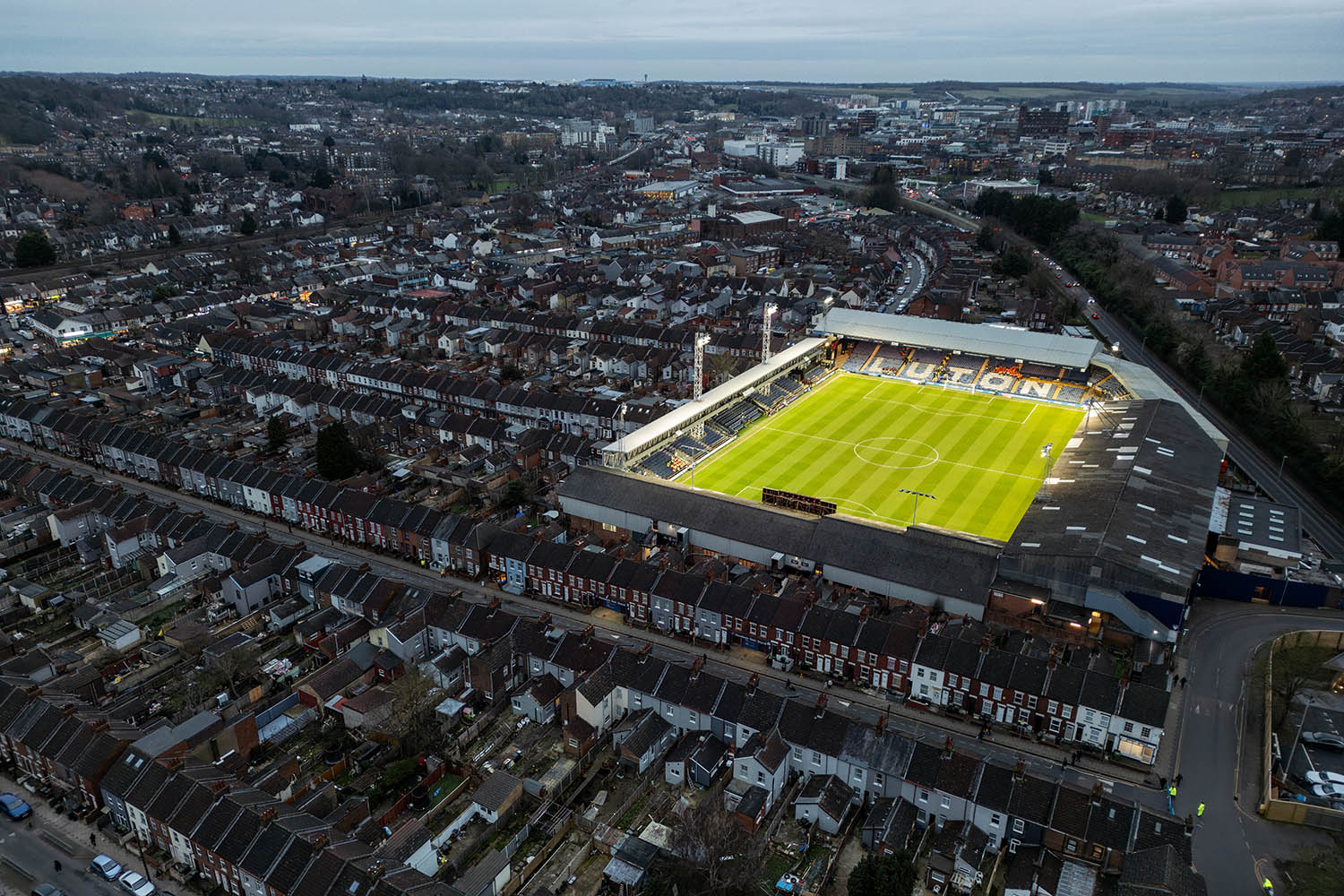The roar from the ground was so loud you could hear it from Haji Foods, where shoppers were picking over the fruit and veg. Shandon Baptiste had scored in the 90th minute against Coventry – and Luton were out of the Championship bottom three, with one game remaining. In the streets surrounding Kenilworth Road, the bustle of market day went on.
Bury Park is the de facto centre of the South Asian community in Luton, and the football ground sits in the middle of it. A generation ago, the local shopkeepers here would gather defensively in front of their businesses at the end of games, alert for trouble. These days there is a far better relationship with their footballing neighbours - and plenty around here will have woken up disappointed, after yesterday’s defeat to West Bromwich Albion consigned the Hatters to back-to-back relegations.
That growing Asian interest is less well represented inside the Kenny. Away fans, who have to squeeze their way into the ground between the terrace houses on Oak Road, know just how tight capacity is. And most of it’s taken up by legacy season ticket holders, from the white working-class community which has been the club’s enduring support base. “Had we got 25,000 seats at Kenilworth Road we’d have been selling every single one of them during that season in the Premier League – we absolutely know that,” said Luton chairman Gary Sweet. “We want to be able to harness and grow that support base. The challenge here is we’ve got roughly 11,500 in and out every week and by and large, they're the same supporters – because we haven't got any spare seats.”
In the town centre, change is coming. Opposite the Norman church that has stood for almost a millennium, diggers and cranes are finally at work. Power Court, the site intended for Luton’s new stadium, has lain derelict for decades, and many townsfolk wondered whether this latest venture would ever break ground. Over the past two decades, they have seen plenty of proposals founder or fail.
Resource and investment have long been a problem in a place with some of the highest levels of child poverty in the country, and the Vauxhall plant, once a mainstay of employment in the area, closed its doors for good in March. This week, however, the club announced its construction timeline for the 25,000-seater that will change the face of the town (the River Lea – buried for decades – is even being resurrected as a picnicking spot). The new stadium will be ready to host its first competitive match at the start of the 2028/29 season.
Luton Town’s directors had always promised to ringfence the club’s Premier League windfall to finance the project, and parachute payments since relegation have increased the pot. David Pleat, the pundit and former Luton manager, believes the leadership has been “very shrewd” to avoid indulging in expensive signings – but focusing on the future does have consequences for the present. The team began their return to the Championship with the footballing equivalent of a raging hangover, missing five first-team players to injury and having lost the creative skills of Ross Barkley to Aston Villa. “He was the one that made the chances,” says Pleat. “He was the one who had the disguise passes, he was the brains behind the attack.”
Luton lost seven of their first 10 games and by October had just a single win in 14. They fell through the table like a veteran stuntman, with a defence that shipped the same goals week on week. Matters appeared to reach their nadir in a 5-1 defeat at Middlesbrough in November, when manager Rob Edwards, who had taken the team up to the Premier League and almost kept them there, announced his future was “out of my hands”. The club – with whom he had signed a four-year contract in the summer – stuck with him until January. They lost seven more games in the interim.
In the Luton training ground – on the airport side of town, opposite the Vauxhall land that will now become a distribution centre – Mick Harford is still struggling to comprehend it. The chief recruitment officer, who first arrived at the club 40 years as a £250,000 striker from Birmingham City, says there’s “no one thing” that can explain this season’s dramatic failure and that Edwards’s departure was “very, very tough” for everyone at the club. An emotional farewell in the dressing room was a sign of the mutual and continued affection – it’s rare for a departing manager to stick around for goodbyes.
It took until March for Luton to win their first away game, but a turnaround under Matt Bloomfield, arrived from Wycombe Wanderers, including three wins in their final four matches, almost delivered a last-gasp escape from relegation.Sweet is insistent that dropping down a league has no impact on the club’s long-term plans. “We might be in League 1, we might be in League 2 – we don’t freak out, thinking our ambition should change. Because that Premier League season taught us that our ambition should be high.”
And while the fleeting spotlight that the top flight brought to the town may have gone, the economic legacy seems real enough. The airport has recently had its plans for an expansion approved, and Universal Studios are to build a new theme park just to the north, outside Bedford. The Hatters are going down but the town may – finally – be looking up.
Newsletters
Choose the newsletters you want to receive
View more
For information about how The Observer protects your data, read our Privacy Policy
Photograph by Richard Heathcote/Getty Images

